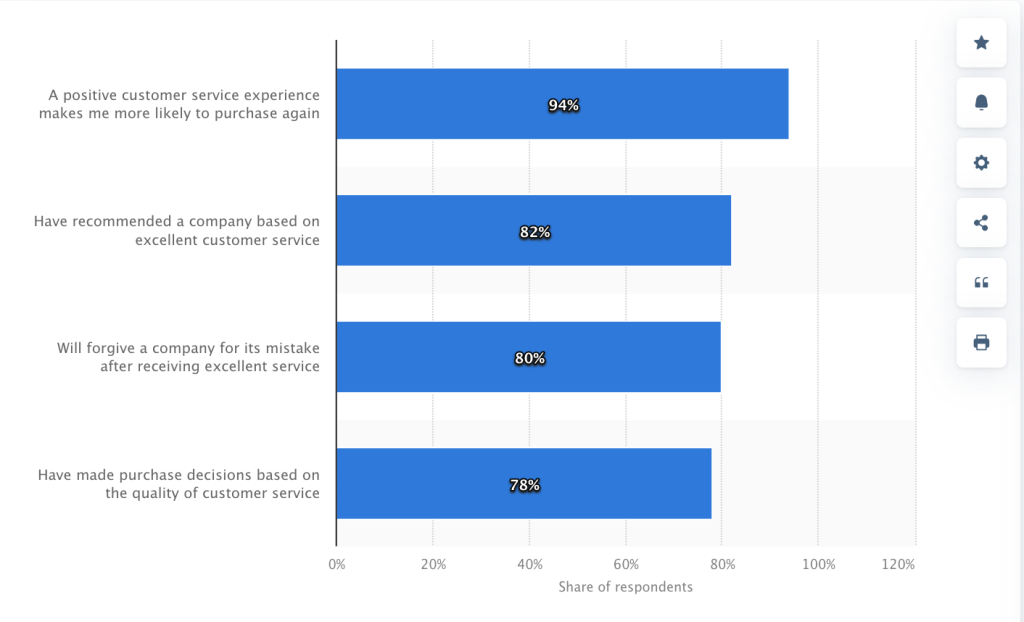Mistakes happen. Agent mistakes in customer service can have a significant impact on both the business and its reputation. Agents may unintentionally provide incorrect information, misunderstand customer needs, or fail to deliver satisfactory solutions.
Of course, mistakes are not failures, but lessons. It’s important for businesses to understand the nature, impact, and potential causes of agent mistakes. That can help come up with strategies to minimize future errors by implementing training programs, utilizing technology, and continuously monitoring and improving agent performance.
Understanding the Impact of Agent Mistakes
Mistakes made by customer service agents can have far-reaching consequences for a business. When customers receive poor service, they may become dissatisfied, leading to negative reviews, reduced loyalty, and even lost revenue. Additionally, poor customer service experiences can quickly spread through word-of-mouth and social media, further damaging the company’s reputation. It is essential to recognize the impact that agent mistakes can have and take proactive steps to prevent them.
Poor customer service can often result in loss of business and, subsequently, revenue. When customers receive subpar service, they are more likely to take their business elsewhere. In today’s competitive market, customers have numerous options, and they will not hesitate to switch to a competitor if they feel undervalued or mistreated. This loss of customers directly impacts the company’s bottom line, reducing revenue and hindering growth.
Customers don’t compare you only to your direct competition anymore. Customers now compare you to the best service they have received from anyone, regardless of the type of business or industry.
— Shep Hyken (@Hyken) November 29, 2020
The impact of agent mistakes extends beyond the immediate customer interaction. In the age of online reviews and social media, news of a negative customer service experience can spread like wildfire. Dissatisfied customers are quick to share their grievances, warning others to steer clear of the company. Negative reviews and feedback not only deter potential customers but also make it challenging to attract new ones. The company’s reputation takes a hit, and rebuilding trust becomes an uphill battle.

Dissatisfied customers are more likely to share their negative experiences with friends, family, and colleagues. This word-of-mouth marketing can amplify the impact of the original mistake, reaching a wider audience and potentially deterring even more potential customers. The negative reputation created by agent mistakes can linger for a long time, hindering the company’s growth and success.
Identifying Common Agent Mistakes in Customer Service
To effectively eliminate agent mistakes in customer service, it is crucial to identify the most common issues that arise in customer service interactions. By understanding these mistakes, businesses can develop targeted strategies for improvement and prevention.
However, it is important to note that customer service agents are human beings, and mistakes are bound to happen from time to time. The key is to minimize these mistakes and learn from them to continuously enhance the customer experience.
Communication Errors and Misunderstandings
Poor communication is a common cause of agent mistakes in customer service. Agents may misinterpret customers’ inquiries or fail to provide clear information. Misunderstandings can lead to frustration, confusion, and ultimately, unresolved issues. Additionally, if agents use technical jargon or complex language customers may not understand them. This can result in customers feeling overwhelmed or even more confused than before.
To combat these mistakes, businesses should emphasize the importance of effective communication skills during agent training and provide ongoing support and feedback. Agent training should focus on active listening, empathy, patience, clarity, adaptability, and persuasion skills. Continuous development, refinement, and assessment of these skills can help agents achieve better communication and engagement with their customers.
Grammar, spelling, and typing skills are crucial in written communication with customers. This includes email, text, and chat communications. Companies who include these skills in their agent training see fewer agent mistakes in customer service communications.
Lack of Product or Service Knowledge
Customer service agents must possess a deep understanding of the products or services they are supporting. Without this knowledge, agents may struggle to answer customer questions accurately or provide appropriate solutions.
Ongoing training programs should focus on equipping agents with comprehensive product knowledge and keeping them updated with any changes or updates. This includes providing agents with access to product manuals, FAQs, and other resources that can help them stay informed and confident in assisting customers.
Moreover, businesses should encourage agents to proactively seek information and stay curious about the products or services they are representing. This can involve attending product demonstrations, participating in workshops, or trying out the products themselves. By immersing themselves in the product or service, agents can better understand customer needs and provide more effective solutions.
Enabling agents to access a searchable knowledge base and implementing automation tools that help quickly locate required information will result in fewer mistakes. Knowledge is power and agents need it to efficiently help customers.
Inadequate Problem-Solving Skills
Effective problem-solving is a crucial skill for customer service agents. Agents must be able to analyze the situation, identify the underlying issues, and provide suitable solutions.
Inadequate problem-solving skills can result in unresolved customer problems, escalating frustration, and decreased customer satisfaction. Training programs should prioritize the development of problem-solving skills, focusing on critical thinking, creativity, and resourcefulness.
One effective approach to enhancing problem-solving skills is through scenario-based training. Agents can be presented with various customer scenarios and guided through the process of analyzing the problem, exploring potential solutions, and selecting the most appropriate course of action.
Additionally, businesses can encourage agents to collaborate and share their experiences and strategies for problem-solving. This can be done through team meetings, online forums, or even mentorship programs. By fostering a culture of continuous learning and knowledge sharing, businesses can empower their agents to become more effective problem solvers.
Implementing Effective Training Programs
Eliminating agent mistakes in customer service requires a comprehensive and ongoing training program. By equipping agents with the necessary skills and knowledge, businesses can enhance customer experiences and minimize errors.
The Role of Continuous Training
Customer service training should not be a one-time event. Continuous training ensures that agents stay up-to-date with best practices, industry trends, and product knowledge. Regular training sessions, workshops, and seminars provide agents with opportunities to improve their skills and stay engaged. By investing in ongoing training, businesses can empower their agents to deliver exceptional customer service.
It’s important to note that agent experience and job satisfaction have a major impact on their engagement with customers. Engaged agents make fewer mistakes.
Related read: How to motivate contact center agents.
Focusing on Soft Skills Development
While product knowledge is essential, it is equally important to focus on the development of soft skills. These skills include effective communication, active listening, empathy, and conflict resolution. Soft skills enable agents to connect with customers on a personal level, understand their needs, and provide empathetic and satisfactory solutions. Training programs should incorporate exercises and role-playing scenarios to help agents develop these crucial skills. Highlighting best practices in customer service training helps keep communication topics fresh in agents’ minds, minimizing the risk of mistakes.
Technical Training for Customer Service Agents
With advancements in technology, customer service agents need to be proficient in various tools and systems. Training programs should include technical training to familiarize agents with customer relationship management (CRM) systems, knowledge databases, and any other relevant software. By equipping agents with the necessary technical skills, businesses can streamline operations, reduce errors, and improve the overall customer experience.
Utilizing Technology to Minimize Errors
Technology plays a vital role in minimizing agent mistakes and improving overall customer service. By leveraging the right tools and systems, businesses can streamline processes, enhance efficiency, and ensure accurate information delivery.
The Role of Customer Relationship Management (CRM) Systems
A CRM system serves as a central repository of customer data, interactions, and preferences. With the help of a CRM system, agents can access relevant customer information quickly, ensuring personalized and accurate service. These systems also enable businesses to track customer issues, monitor agent performance, and identify areas for improvement.
How AI and Automation Can Reduce Mistakes
Artificial intelligence (AI) and automation have revolutionized customer service. Chatbots, for example, can help resolve repetitive inquiries, freeing up agents to focus on more complex issues. AI-powered systems can also analyze customer data to identify patterns and trends, enabling businesses to proactively address customer needs. By leveraging AI and automation, businesses can reduce the likelihood of agent mistakes and improve efficiency.
Related read: AI in Customer Service
Monitoring and Improving Agent Performance
Continuous monitoring and improvement of agent performance are essential to eliminate mistakes and enhance customer service. By implementing effective performance by using performance management tools, businesses can identify areas of improvement, provide constructive feedback, and motivate agents to excel.
The Importance of Regular Performance Reviews
Regular performance reviews provide an opportunity to assess agent performance, identify strengths and weaknesses, and set goals for improvement. These reviews should be conducted in a supportive and constructive manner, focusing on both positive feedback and areas for growth. By providing regular feedback, businesses can ensure that agents are aware of their performance and have the necessary support to excel.
Strategies for Constructive Feedback and Improvement
Constructive feedback plays a crucial role in improving agent performance. Supervisors should provide specific feedback, highlighting both areas of improvement and successes. Additionally, coaching and mentoring programs can help agents develop specific skills and overcome challenges. By providing ongoing feedback and support, businesses can create a culture of continuous improvement.
Eliminating Agent Mistakes in Customer Service
Eliminating agent mistakes in customer service is key to providing satisfactory customer experiences and maintaining a positive business reputation. By understanding the impact of agent mistakes, identifying common issues, implementing effective training programs, utilizing technology, and monitoring agent performance, businesses can optimize their customer service operations and deliver exceptional service that exceeds customer expectations.




